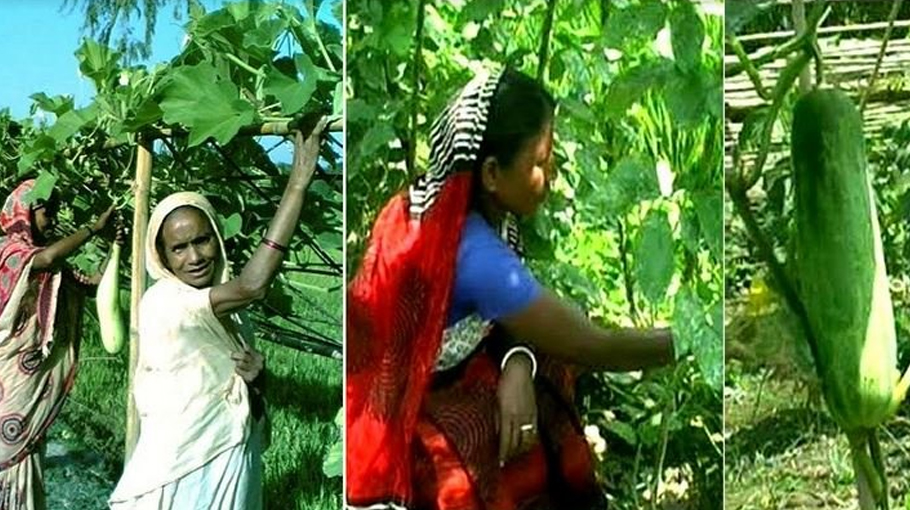Home-based farming empowering rural women

Scores of rural women like Nur Mahal are getting dietary and financial benefit from growing vegetables on home-yard as the government-sponsor nationwide house-based farming technology is now being helped rural poor to enrich their nutrition development.
“I am getting all seasonal vegetables and earning surplus amount through growing vegetables on my home-yard,” said Nur Mahal Begum of village Atgachia of Masumpur union under Shibpur upazila of Narshingdi district.
Nur Begum who is producing organic vegetables on 1.5 decimal of land around her house with the technical support from ‘Establishment of Family Nutrition Garden in Homestead and Uncultivable Fallow Land Project’, said the vegetables produced under the project is comparatively ‘tasteful’ and price of these kitchen items are also higher than those produced in unhygienic way.
“We get necessary vegetables from this home-yard for personal consumption and in addition, earning Taka 300-400 daily by selling vegetables produced from home-based garden,” said Nupur Akhter, another housewife of village Kamlapur of Putijana union under Phulbaria Upazila of Mymensingh district.
Apart from growing vegetables, the 35-year old female farmer said, “Fifty malta fruit saplings have also been transplanted in my home-garden as area-wise six types of fruit sapling, including papaya, citrus, malta, safeda (Sapodilla), amrapali mango and guava are being distributed under the project in line with the government policy to fulfil nutrition demand of the rural poor.
A latest UNICEF report has showed that more than three lakh children, aged less than five years, suffered from severe malnutrition across the globe.
Bangladesh is the fifth-worst among countries where children suffer from severe malnutrition, according to the report.
The report titled "Severe wasting: An overlooked child survival emergency" showed that Bangladesh ranks fifth with 327,859 children affected by severe wasting while India ranked first with 5,772,472 affected children and Pakistan third with 678,925 affected children.
The project has helped the woman to become financially self-relient, said Jesmin Akhter of Phulbaria Upazila under Mymensingh district, adding, “Now I am no more dependent on my husband for finance.”
Different seasonal vegetables, including bottle guard (lau), sweet guard (misti-kumra), Okra (derosh), aubergine (begun), papaya, green chilli, cucumber, various leafy vegetables like Water spinach (Kalmi Shak), Red spinach (Lalshak), stem spinach (data shak), Indian spinach (Puishak) are being produced three times in a year while some of the vegetable varieties are being produced all over the year using the farm technology.
Under the risk of possible food scarcity globally due to the Covid-19 Pandemic, the Department of Agricultural Extension (DAE) is implementing a three-year mega project in 492 upazilas of 64 districts with a cost of Taka 438.47 crore since April 2021.
The installation of five beds model in the household premises under the farming technology basically introduced to mitigate food scarcity at the remote areas and fulfil nutrient demand of the rural poor, said Dr Md Akram Hossain Chowdhury, project director of the DAE.
Under the farming technology, rural vegetable growers are getting necessary seeds, vermin-compost fertilizer and irrigation equipments at free of cost round the year for cultivating different seasonal vegetables on their homestead garden.
After the beginning of the project, Dr Hossain said over 1.13 lakh family nutrition garden demos plots have been set up across the country where more than 1520 acres of fallow land also come under cultivation.
Farmers are now witnessing production of 378 kg vegetables per day and so far they earned Taka 66 crore by producing more than 26,631 tonnes of vegetables.
More than 6.3 lakh farmers’ family will be benefited directly.



